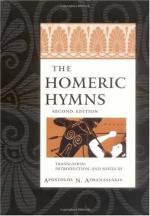Thus the morality of the savage is not merely tribal (as is often alleged), and is carried into practice, as well as inculcated, in some regions, not in all, during the Mysteries.
For these reasons, if the Greek Mysteries be survivals of savage ceremonies (as there is no reason to doubt that they are), the savage association of moral instruction with mummeries might survive as easily as anything else. That it did survive is plain from numerous passages in classical authors. {76a} The initiate “live a pious life in regard to strangers and citizens.” They are to be “conscious of no evil”: they are to “protect such as have wrought no unrighteousness.” Such precepts “have their root in the ethico-religious consciousness.” {76b} It is not mere ritual purity that the Mysteries demand, either among naked Australians, or Yao, or in Greece. Lobeck did his best to minimise the testimony to the higher element in the Eleusinia, but without avail. The study of early, barbaric, savage, classical, Egyptian, or Indian religions should not be one-sided. Men have always been men, for good as well as for evil; and religion, almost everywhere, is allied with ethics no less than it is overrun by the parasite of myth, and the survival of magic in ritual. The Mother and the Maid were “Saviours” ([Greek text]), “holy” and “pure,” despite contradictory legends. {77} The tales of incest, as between Zeus and Persephone, are the result of the genealogical mania. The Gods were grouped in family-relationships, to account for their companionship in ritual, and each birth postulated an amour. None the less the same deities offered “salvation,” of a sort, and were patrons of conduct.
Greek religion was thus not destitute of certain chief elements in our own. But these were held in solution, with a host of other warring elements, lustful, cruel, or buffooning. These elements Greece was powerless to shake off; philosophers, by various expedients, might explain away the contradictory myths which overgrew the religion, but ritual, the luck of the State, and popular credulity, were tenacious of the whole strange mingling of beliefs and practices.
* * * * *
The view taken of the Eleusinia in this note is hardly so exalted as that of Dr. Hatch. “The main underlying conception of initiation was that there were elements in human life from which the candidate must purify himself before he could be fit to approach God.” The need of purification, ritual and moral, is certain, but one is not aware of anything in the purely popular or priestly religion of Greece which exactly answers to our word “God” as used in the passage cited. Individuals, by dint of piety or of speculation, might approach the conception, and probably many did, both in and out of the philosophic schools. But traditional ritual and myth could scarcely rise to this ideal; and it seems exaggerated to say of the crowded Eleusinian throng of pilgrims that “the race of mankind




